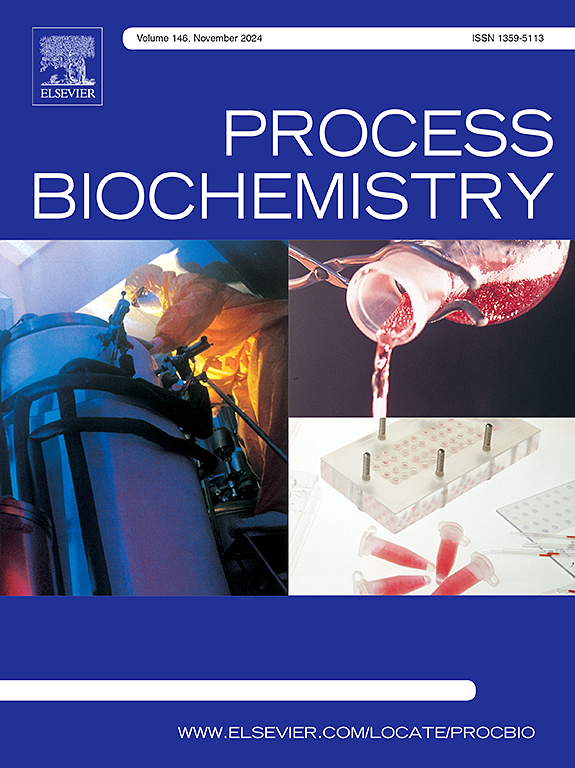固定化脂肪酶后封装在铜基 MOF 中,提高了生物柴油合成的稳定性
IF 3.7
3区 生物学
Q2 BIOCHEMISTRY & MOLECULAR BIOLOGY
引用次数: 0
摘要
与传统的石油柴油相比,生物柴油更加环保。作为一种绿色化学技术,利用脂肪酶催化生产生物柴油的方法可以进一步减少其对环境的负面影响。本研究将固定在磁性纤维素上的脂肪酶包埋在 Cu(PABA)中,然后利用该生物复合材料(MCL@Cu(PABA))生产生物柴油。纤维素良好的生物相容性和柔性骨架结构可缓冲金属有机框架(MOFs)形成过程中对酶分子的挤压作用,MOFs 保护层可减少变性剂对酶分子的破坏。该生物催化剂具有更高的活性和稳定性,失活常数(Kd)更低。在优化的反应条件下,生物柴油产率可达 78.4%。生物催化剂重复使用 7 次后,生物柴油产率仍可达 58.8%。此外,存放 30 天后,生物柴油产量仍可达 70.3%。所有实验产量的标准偏差(SD)在 2.4 % 至 4.5 % 之间。二级结构分析表明,包裹 Cu(PABA)后,脂肪酶的刚性结构和活性构象得到了增强。本文章由计算机程序翻译,如有差异,请以英文原文为准。
Immobilized lipase post-encapsulated in Cu-based MOFs with promoted stability in biodiesel synthesis
Biodiesel is more environmentally friendly compared to traditional petroleum diesel. The method of producing biodiesel catalyzed by lipases, as a green chemistry technology, can further reduce its negative impact on the environment. In this work, lipase immobilized on magnetic cellulose was embedded in Cu(PABA), and then the biocomposite (MCL@Cu(PABA)) was used for biodiesel production. The good biocompatibility and flexible skeleton structure of cellulose can buffer the compression effect on enzyme molecules during the formation of Metal-Organic Frameworks (MOFs), and the MOFs protective layer can reduce the damage caused by denaturants to enzyme molecules. The biocatalyst showed enhanced activity and stability with a lower deactivation constant (Kd). Under the optimized reaction conditions, the biodiesel yield can reach 78.4 %. After reused for 7 times, the biocatalyst can still achieve a biodiesel yield of 58.8 %. Moreover, after stored for 30 days, the biodiesel yield can still reach 70.3 %. For all experimental yields, the standard deviation (SD) ranged from 2.4 % to 4.5 %. Secondary structure analysis showed that the rigid structure and active conformation of lipase was enhanced after Cu(PABA) encapsulation.
求助全文
通过发布文献求助,成功后即可免费获取论文全文。
去求助
来源期刊

Process Biochemistry
生物-工程:化工
CiteScore
8.30
自引率
4.50%
发文量
374
审稿时长
53 days
期刊介绍:
Process Biochemistry is an application-orientated research journal devoted to reporting advances with originality and novelty, in the science and technology of the processes involving bioactive molecules and living organisms. These processes concern the production of useful metabolites or materials, or the removal of toxic compounds using tools and methods of current biology and engineering. Its main areas of interest include novel bioprocesses and enabling technologies (such as nanobiotechnology, tissue engineering, directed evolution, metabolic engineering, systems biology, and synthetic biology) applicable in food (nutraceutical), healthcare (medical, pharmaceutical, cosmetic), energy (biofuels), environmental, and biorefinery industries and their underlying biological and engineering principles.
 求助内容:
求助内容: 应助结果提醒方式:
应助结果提醒方式:


